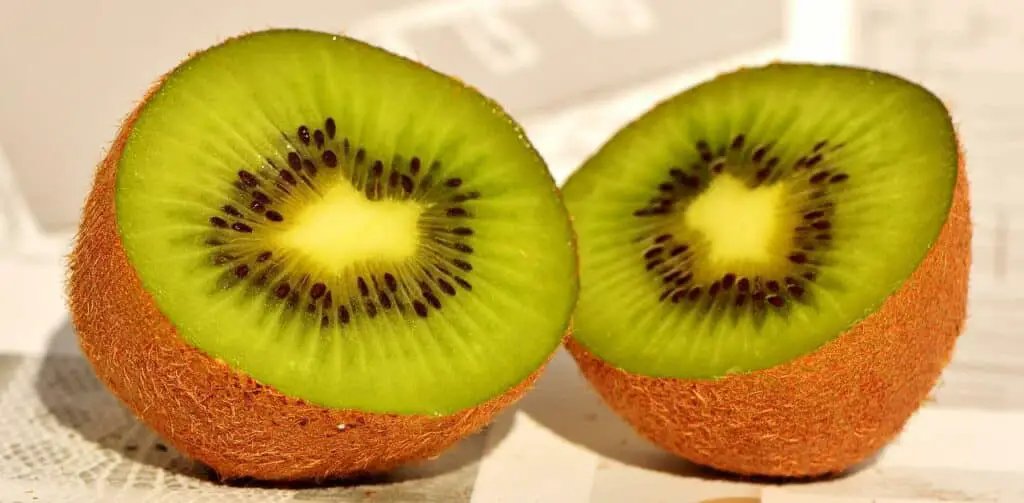Golden Kiwi is a popular and tasty fruit loved by many; you probably have a bunch in your fridge.
Apart from being delicious, with exotic appearance and flavor, golden kiwi is a nutritious fruit with vitamins.
Based on these facts, you’ll wonder whether your canine friend can safely have golden kiwi.
So, can dogs have golden kiwi?
Yes, golden kiwi is a nutritious fruit with vitamins and minerals needed for the well-being of dogs.
Dogs love golden kiwis because they are delicious and more filling.
Now that dogs can have golden kiwi, what are the health benefits of the fruit?
Are there concerns and risks to be aware of before feeding your pup golden kiwi?
Read on to get all your answers if you’re asking yourself such questions.

Reasons Dogs Should Eat Golden Kiwi
Golden kiwi is a nutritious fruit that contains:
- Vitamin C
- Vitamin E
- Folate
- Potassium
- Copper
- Dietary fiber
These nutrients are essential for the proper functioning of dogs’ systems and organs.
The benefits of feeding your dog golden kiwi are:
Improving the Immune System
You want your furry friend healthy, and by giving them golden kiwi, you’re helping to improve their immune system.
Vitamin C is a powerful antioxidant that helps fight against free radicals and toxins that can damage cells.
If left unchecked, free radicals can lead to tumors which eventually cause cancer in dogs.
Vitamin C also plays an essential role in producing collagen, which is necessary for the health of skin, joints, and connective tissues.
Finally, your dog needs vitamin C to produce white blood cells.
Enough white blood cells in a dog’s body aid in fighting infections.
As a result, your canine will have a strong immunity that will save you extra vet visits and medication costs.

Enhancing Digestion
Dogs need fiber in their diet to maintain regular bowel movements and prevent constipation.
Constipation can cause your dog much pain and even lead to severe health problems like lethargy.
The probiotics in the golden kiwi help good bacteria to grow in the gut.
This is important for your dog’s overall health since a healthy gut means a strong immune system.
Fiber also helps to regulate blood sugar levels and cholesterol levels in dogs.
This is especially important for senior and overweight dogs since they’re more prone to developing diabetes and heart disease.
Developing a Healthy Heart
Potassium is an electrolyte that helps regulate blood pressure and heart function.
It also aids in muscle contraction and nerve function.
A lack of potassium can lead to irregular heartbeat, muscle weakness, and paralysis.
Therefore, it’s essential to ensure your dog gets enough potassium in his diet.
Golden kiwi is an excellent source of potassium, and by feeding your dog the fruit, you’re helping to keep their heart healthy.
Developing Healthy Skin and Coat
You’re a happy dog parent when you see your dog with a shiny coat and healthy skin.
Golden kiwi can help make this happen since it’s rich in vitamins C and E.
Vitamin C is an antioxidant that helps to protect cells from damage.
It also plays a role in collagen production, which is vital for the health of skin, joints, and connective tissues.
Vitamin E is another antioxidant that helps to protect cells from damage.
It also helps keep the skin moisturized and prevents it from drying out.
A lack of vitamins C and E lead to dry, dull fur and brittle nails.
Therefore, it’s essential to ensure your dog gets enough of these vitamins in their diet.
Reducing Inflammation
The anti-inflammatory properties of vitamin E help reduce swelling and pain caused by inflammation in dogs.
This is beneficial for conditions like arthritis, where there is inflammation in the joints.
Golden kiwi is an excellent source of vitamin E, and by feeding your dog the fruit, you’re helping to reduce inflammation in their body.
Developing Strong Bones and Teeth
A diet rich in copper helps keep bones and joints healthy by supporting collagen production and preventing osteoarthritis.
Copper also helps form red blood cells and maintain a healthy nervous system.
A lack of copper can lead to anemia, joint problems, and neurological disorders.
Therefore, it’s essential to ensure your dog gets enough copper in their diet.
Because golden kiwi is an excellent source of copper, feeding your dog the fruit helps develop strong bones and teeth.
Risks of Golden Kiwi to Dogs
Although full of benefits, there are risks with feeding your dog golden kiwi.
The most common risks are:
Intestinal Blockage
The seeds of the golden kiwi fruit can cause intestinal blockage if swallowed.
These seeds are hard and can get stuck in your dog’s intestines.
If not treated, this can lead to serious health problems or even death.
Therefore, it’s essential to remove the seeds from the fruit before feeding it to your dog.
You can also cut the fruit into small pieces to avoid choking hazards.
Gastrointestinal Issues
Giving your pup excessive amounts of golden kiwi can cause gastrointestinal issues like diarrhea, vomiting, and bloating.
The fruit is high in fiber and can act as a laxative when consumed in large amounts.
To avoid these issues, feed your dog the fruit in moderation.
Start with small amounts and increase the amount gradually over time if your dog does not react negatively.
Frequently Asked Questions
What happens if a dog eats a kiwi?
If a dog eats kiwi, he’ll get essential nutrients like vitamins C and E, copper, fiber, and folate.
These nutrients are vital for maintaining a healthy heart, skin, coat, bones, and teeth.
Are kiwi seeds bad for dogs?
Yes, kiwi seeds are bad for dogs if swallowed.
The seeds are hard and can get stuck in your dog’s intestines, causing an intestinal blockage.
If not treated, this can lead to serious health problems or even death.
Final Thoughts
Dogs can have golden kiwi without developing health complications.
The fruit is an excellent source of vitamins, minerals, and antioxidants beneficial for your dog’s health.
Golden kiwi contains seeds that can expose your canine to risks like choking and intestinal blockage.
To avoid these risks, remove the seeds from the fruit before feeding it to your dog.
You should also cut the fruit into small pieces and feed your dog in moderation.
- What Dog Breeds Have Pink Skin? - March 24, 2023
- What Are the Most Inspiring Dog Breeding Quotes? - March 20, 2023
- Can Pheromone Spray Help Improve Dog Breeding Results? - March 19, 2023








